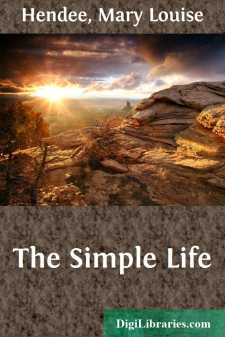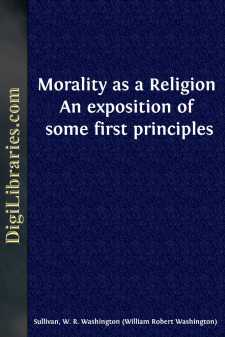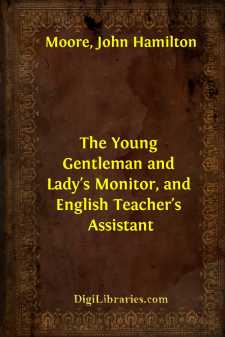Juvenile Nonfiction
- Animals 10
- Art 1
- Biography & Autobiography 2
- Boys & Men 1
- Business & Economics 3
- Cooking & Food 2
- Gardening 1
- General 32
- Girls & Women 7
- History 2
- Holidays & Celebrations 1
- Lifestyles 79
- Literary Criticism & Collections 5
- Nature 11
- Readers 40
- Religion 4
- Sports & Recreation 1
Juvenile Nonfiction Books
Sort by:
by:
Unknown
CHAPTER I. THURSDAY. At a pleasant village a few miles from London, resided a widow-lady of the name of Harley; she had but one child, and to forming her manners and instructing her mind she devoted her whole time. Anne (for so was this little girl named) was an amiable child; she rewarded her mother's care and affection, by paying great attention to her instructions; like all other children, she...
more...
CHAPTER I Perhaps the things which happened could only have happened to me. I do not know. I never heard of things like them happening to any one else. But I am not sorry they did happen. I am in secret deeply and strangely glad. I have heard other people say things—and they were not always sad people, either—which made me feel that if they knew what I know it would seem to them as though some...
more...
by:
William Martin
PREFACE. The prime object of this book is to induce and to teach boys and girls to spend their hours out of school in such a manner, as to gain innocent enjoyment while they promote their own health and bodily strength. The Author has never lost sight of this object, considering it to be what properly belongs to a Book of Sports. He has, however, in many instances, had in view, in a subordinate degree,...
more...
INTRODUCTIONMother CareyAll-mother! Mater Cara! I have never seen you, but I hungered so to know you that I understood it when you came, unseen, and silently whispered to me that first time in the long ago. I cannot tell the children what you look like, Mother Carey, for mortal eye hath never rested on your face; and yet I can offer them a portrait, O strong Angel of the Wild Things, neither young nor...
more...
IOUR COMPLEX LIFE AT the home of the Blanchards, everything is topsy-turvy, and with reason. Think of it! Mlle. Yvonne is to be married Tuesday, and to-day is Friday! Callers loaded with gifts, and tradesmen bending under packages, come and go in endless procession. The servants are at the end of their endurance. As for the family and the betrothed, they no longer have a life or a fixed abode. Their...
more...
THE CURTAIN LIFTED. Pride of city is natural to men, in all times, if they live or have lived in a metropolis noted for dignity or prowess. Cæsar boasted of his native Rome; Lycurgus of Sparta; Virgil of Andes; Demosthenes of Athens; Archimedes of Syracuse; and Paul of Tarsus. I should suspect a man of base-heartedness who carried about with him no feeling of complacency in regard to the place of his...
more...
by:
Horatio Alger
CHAPTER I.A FAITHLESS GUARDIAN."Well, good by, Rodney! I leave school tomorrow. I am going to learn a trade." "I am sorry to part with you, David. Couldn't you stay another term?" "No: my uncle says I must be earning my living, and I have a chance to learn the carpenter's trade." "Where are you going?" "To Duffield, some twenty miles away. I wish I were in...
more...
by:
D. Starke
CHAPTER I THE NEED OF POISE IN LIFE Lack of poise has always been an obstacle to those who are imbued with the desire to succeed. In every age the awkwardness born of timidity has served to keep back those who suffered from it, but this defect has never been so great a drawback as in the life of to-day. The celebrated phrase of the ancient Roman writer who said, "Fortune smiles on the brave,"...
more...
PREFACE. A recent work by M. Guyau was originally announced under the title of The Non-Religion of the Future, and, doubtless, an impression is generally prevalent that, with the modification or disappearance of traditional forms of Belief, the fate of Religion itself is involved. The present volume is a plea for a reconsideration of the Religious question, and an inquiry as to the possibility of...
more...
ASSISTANT. 1. I am very much concerned when I see young gentlemen of fortune and quality so wholly set upon pleasure and diversions, that they neglect all those improvements in wisdom and knowledge which may make them easy to themselves and useful to the world. The greatest part of our British youth lose their figure, and grow out of fashion, by that time they are five and twenty. 2. As soon as the...
more...











